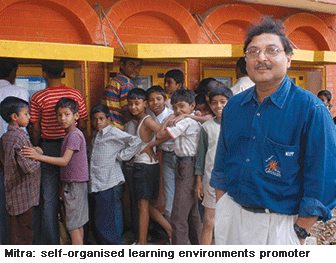 When Sugata Mitra won the TED Prize, it didn’t just give him $1 million (Rs.6 crore) to put ideas about internet-based learning into action. It also gave the professor of educational technology at Newcastle University a global platform for his theories, which have now been adopted in thousands of schools and communities worldwide.
When Sugata Mitra won the TED Prize, it didn’t just give him $1 million (Rs.6 crore) to put ideas about internet-based learning into action. It also gave the professor of educational technology at Newcastle University a global platform for his theories, which have now been adopted in thousands of schools and communities worldwide.
It is an impressive illustration of what winning the prize, awarded by the California-based not-for-profit ideas network TED, can do for a scholar’s global impact. The money allowed Dr. Mitra to build seven “self-organised learning environments”— classrooms of the future where children study by trying to answer big questions for themselves in groups — using the internet.
Two of the labs are in the UK, in North Tyneside and County Durham, and five are in India. The project’s flagship centre, Area Zero, which opened near Kolkata in January, can accommodate up to 48 children at once, using 15 computers. Using the internet to learn, Mitra says, better reflects the way young people now use mobile phones and tablets not only to entertain themselves and interact, but also to access information.
The TED money also supported the establishment of an interdisciplinary centre at Newcastle to study self-organised learning, and development of a “granny cloud”, a community mainly comprising retired teachers, who encourage learners via Skype with questions and assignments. Drawing on technological support from Microsoft and Skype, the learning labs form a digital platform that Mitra calls the School in the Cloud, allowing anyone anywhere in the world to participate in the experiment.
And they have joined in droves. More than 10,000 self-organised learning environments (SOLEs) have been set up across five continents, and a SOLE toolkit has been downloaded more than 67,000 times. Mitra says that after he won the TED Prize, self-organised learning environments seemingly went “viral”. “It was a life-changing thing because until TED, I was struggling around, tinkering with a few places here and there,” he recalls.
The project has opened up new research avenues for Mitra, who wants to explore why children can apparently learn more quickly — and pick up new languages more swiftly —when working independently in groups. Two years on from his win, he hopes his idea of using the internet to deliver more effective and democratic education can continue to transform curricula and pedagogy. “Children are alienated from school because school prepares them to store answers in their head, from an age when you had no other way to fish for an answer. That’s all gone now, so naturally children don’t understand. A question asked today all over the world is ‘why is it important for me to learn this’ and we don’t give them an answer very often,” he says.
Dirty little secret
Nearly a third of academics in the UK don’t believe foreign students in their departments speak and write English at a level adequate for degree-level study, a Times Higher Education survey suggests. According to the results of the second annual THE Best University Workplace Survey, 31 percent of scholars believe that undergraduates from overseas don’t have the necessary English skills. .gif)
THE questioned more than 4,150 university employees from nearly 140 institutions for the survey. The poll sought their views on everything from pay and conditions to their relationships with co-workers, and some of the thousands of comments made by respondents show the difficulties that academics can face with overseas students’ English.
A staff member at a south of England institution says she feels “uneasy” that students with poor language skills who are admitted are effectively being “set up to fail”. Another, from a Scottish university, writes that tutors “must lower the level of classes so everyone can keep up — to the disadvantage of native speakers”. And a senior lecturer at a Russell Group university describes the issue of international student standards as higher education’s “dirty little secret”.
A research assistant at a university in the Midlands says that her institution’s strategy is to try “to attract as many international students as possible regardless of their language skills, simply because they pay higher fees” — an accusation made by several respondents about their respective universities. “These students are being ripped off, because although they’re told they have the language skills for university-level study, they patently don’t,” she adds.